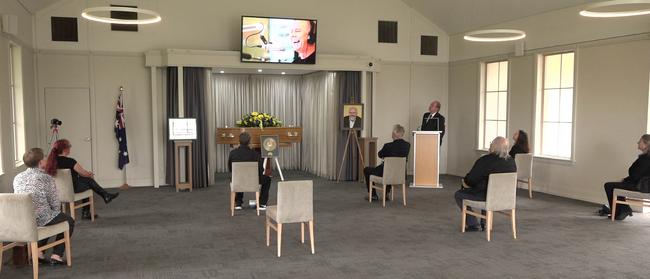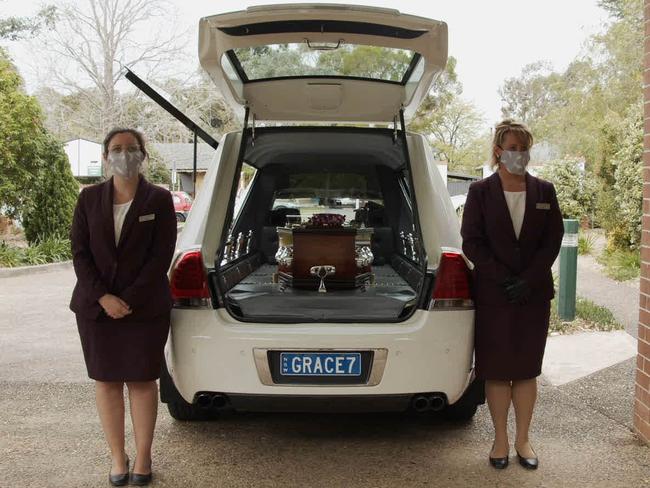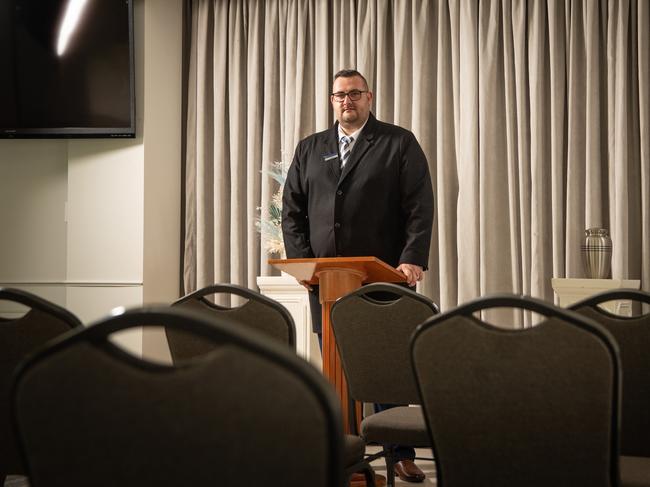Coronavirus Qld: Strange reality of funerals under lockdown
Already a harrowing experience for many, funerals have now become a minefield of rules and regulations, despite Queensland authorities now allowing up to 100 people to attend.
CM Insight
Don't miss out on the headlines from CM Insight. Followed categories will be added to My News.
Chairs scattered around a large room, compulsory face masks and funerals playing on repeat – this is the stark reality of farewelling a loved one in the wake of COVID-19.
Already a harrowing experience for many, funerals have now become a minefield of rules and regulations, despite Queensland authorities now allowing up to 100 people to attend.
Health Minister Steven Miles provides an update on active COVID-19 cases in Queensland
Experts say interstate mourners can safely attend Queensland funerals
LNP Government would develop COVID-Safe plans for funerals, end-of-life visits
Great-grandmother’s heartbroken family urges government to rethink funeral restrictions
Queensland funeral directors have revealed that small venues are still forced to cap the number of people in an area, with many hosting mourners in a chapel, foyer and car park using speakers or television screens.
Many directors are offering to hold the same service several times throughout the day, so loved ones can attend at different intervals.
At the height of coronavirus funerals were increasingly held at home, with many hoping it would mean a more personal experience, or give them a way to skirt attendance limits.
George Hartnett Metropolitan Funerals regional manager Matthew Hansen said he had 14 venues across Brisbane, but only one was larger than 200sq m.
He said instead directors were operating funerals at timed intervals and had repurposed funeral catering lounges, adding extra seating and television screens so people could experience the funeral in another room – but in the same building.

“Particularly for our multicultural communities who might have a vigil the night before the service at one of our chapels and if that chapel could only fit say, 40 people, instead of turning away the larger community, we’d put on one vigil say at 6pm, another at 7pm, so people could come and go and still meet their cultural expectations,” he said.
“My heart breaks for people who haven’t been able to attend in Queensland because they’re in NSW. While they can stream the service, that’s not the same.
“The need to be physically together is really important. My heart breaks for those people.
“I think post-COVID, we will see a lot of people who haven’t been able to attend a funeral because of COVID that will probably have a deeper understanding of the value of a funeral – the need to physically come together and mourn together, share stories and laugh and heal together.”
For Michelle Bova from Funeral Video Australia, the past six months have been a stark contrast to her previous seven years capturing funeral ceremonies.
“I’ve found our role has become more important with only that small number allowed – we’ve had to shift from capturing the attendees to being there as them, so they can experience the ceremonies as recordings,” she said.
Funeral images shared with The Courier-Mail show almost eerie sights of near empty chapels, masked White Lady Funerals staff and even the heartbreaking funeral of NSW radio presenter Stuart Cranney.
Cranney’s service was held at the height of funeral restrictions and only six family members were able to attend.
“That was one of the most extreme cases, he even had family that came from Queensland that couldn’t attend,” she said.

“Even those who were able to make it into those smaller ceremonies, they couldn’t even hug or console each other when things got tough – that’s the most heartbreaking part of witnessing the past couple of months.”
Tasteful Transitions photographer and co-founder Natasha Mary said she had seen a significant increase in people hosting funeral services at home.
“People turned to using their home so they could have more people – there was a really big uptake of people having services in their home,” she said.
“The nice thing for them is people are there and afterwards a number of them have barbecues and it really felt quite Australian.”
Trevor Burstow of Burstow Funeral Care said many funerals had to be delayed, to allow for people who were in quarantine to attend.
He said people also had tried to circumvent restrictions at gravesites by standing outside cemetery property and listening to the service through speakers.
The hardest thing families still had to go through was deciding who would make the 100-person list to attend the funeral, often a gut-wrenching decision, Mr Burstow said.
However, despite certainty around numbers, the funeral industry remains significantly uncertain, Newman Funerals owner and funeral director Luke Newman said.
“Funerals are definitely hard and I suppose it comes down to the moral and compassionate side of it – how can you deny a family coming together to do a human right, which is bury or say goodbye to a loved one? It’s quite difficult,” he said.
“It’s scary thinking about moving forward, is this going to be the new norm? Are we going to have to spread people out in a time where they should be coming together?”
“We heard of police patrolling funerals and finding the mourners and family members that were over 10 people, going into the funeral service or waiting for them outside. That in itself is so distressing and traumatising for the family.”
It comes as the industry also fears a second wave of COVID-19 could see a repeat in difficulties acquiring PPE, with Mr Newman saying it took more than a month to secure a single box of gloves.
“We only have very limited suppliers for products for our industry – I think I can count on one hand how many we have in Australia,” he said.
Karen Hollands, of Tony Hollands Funerals, said she was “nearly in tears” trying to secure personal protective equipment for her staff during COVID-19’s peak.
She said there were also concerns around storage of bodies across funeral homes, mortuaries and hospitals, as other countries saw refrigerator containers coming in to store bodies.
“No one is looking at our industry and saying this could happen here if we are not careful,” she said.
“It is very scary … it can quite possibly go down the path where you don’t have the opportunity and they won’t release the body and they go into these graves, one after the other.”
Simplicity Funerals Beenleigh funeral director Ray Leon said hand sanitiser was the hardest item to acquire in the peak of the pandemic.
He said despite the fact it was not always recognised, the funeral industry was an essential service.
“In my personal opinion, it’s an essential service that has such finality, when every other essential service is concerned with keeping people alive, and that is perhaps why we are not so widely acknowledged,” Mr Leon said.
“Our colleagues in Victoria are again in the middle of a hard lockdown and it really affects families most because their relatives and friends cannot travel to support them when they need it most.”
A Queensland Health spokeswoman said the procurement of PPE by corporate or private businesses was the responsibility of those businesses, just like it was for other private businesses such as supermarkets.

